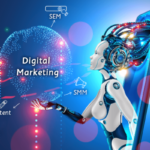
AI Tools Unleashed: Redefining Marketing in the Digital Era
September 17, 2025
Redefining Location Marketing: How AI Transforms Geotargeting
September 17, 2025AI (Artificial Intelligence) Marketing is revolutionizing how businesses approach advertising and customer engagement. By leveraging the power of advanced algorithms, machine learning, and data analysis, AI marketing enables companies to deliver personalized experiences, gain valuable customer insights, and optimize their marketing strategies.
What is AI Marketing?
AI Marketing refers to applying artificial intelligence techniques in marketing to enhance customer interactions, automate processes, and make data-driven decisions. It utilizes algorithms and machine learning models to analyze vast data and derive actionable insights for more effective marketing campaigns.
Evolution of AI in Marketing
AI has come a long way since its inception in science fiction. What was once considered futuristic is now a reality in the marketing world. From basic rule-based systems to sophisticated deep learning algorithms, AI has evolved to deliver more accurate predictions, better recommendations, and improved customer experiences.
Importance of AI Marketing
AI Marketing has become crucial for businesses to stay competitive in today’s digital landscape. By harnessing the power of AI, companies can unlock valuable opportunities to connect with customers on a deeper level, optimize their marketing efforts, and achieve higher conversion rates. Integrating AI technologies in marketing opens up possibilities once only imagined in science fiction.

AI-Driven Personalization in Advertising
One of the critical aspects of AI Marketing is its ability to deliver personalized experiences to individual customers. Personalization plays a significant role in capturing attention, engaging users, and fostering customer loyalty. AI-driven personalization techniques leverage advanced algorithms to analyze customer data and provide tailored recommendations and content.
The Power of Personalization
Personalization in advertising allows companies to cut through the noise and deliver relevant messages to the right audience at the right time. By understanding each customer’s preferences, behavior, and demographics, marketers can create personalized campaigns that resonate with individuals on a deeper level. This level of personalization enhances customer satisfaction, improves brand loyalty, and drives conversions.
AI-Driven Personalization Techniques
AI enables marketers to leverage various techniques for personalized advertising. Let’s explore some of the critical AI-driven personalization techniques:
Machine Learning Algorithms
Machine learning algorithms are at the core of AI-driven personalization. These algorithms analyze vast customer data, such as browsing history, purchase behavior, and demographic information, to predict individual preferences and deliver personalized recommendations and advertisements.
Natural Language Processing
Natural Language Processing (NLP) allows AI systems to understand and interpret human language. In advertising, NLP can analyze customer reviews, social media posts, and online conversations to gain insights into customer sentiment and preferences. This information can be utilized to create targeted ad campaigns that resonate with customers’ emotions and needs.
Predictive Analytics
Predictive analytics utilizes historical data and statistical models to predict future outcomes. In advertising, predictive analytics can identify patterns and trends in customer behavior to anticipate their needs and preferences. Marketers can then leverage these insights to deliver personalized advertisements more likely to resonate with customers and drive conversions.
Recommender Systems
Recommender systems use AI algorithms to suggest products, services, or content to users based on their previous interactions and preferences. These systems analyze customer data, such as purchase history and browsing behavior, to make intelligent recommendations that increase the likelihood of conversion.
Benefits of AI-Driven Personalization
AI-driven personalization offers several benefits for advertisers:
Increased Customer Engagement: Personalized advertisements have a higher chance of capturing and engaging users’ attention, leading to improved click-through rates and conversions.
Improved Customer Experience: By delivering tailored content and recommendations, AI-driven personalization enhances the overall customer experience, making customers feel valued and understood.
Higher Conversion Rates: Personalized advertisements that align with customers’ preferences and needs are more likely to drive conversions, resulting in a better return on investment (ROI) for marketers.
Enhanced Customer Loyalty: Customers who receive personalized experiences are more likely to develop a sense of loyalty towards the brand, leading to repeat purchases and long-term relationships.
AI-driven personalization is reshaping the advertising landscape, allowing companies to connect with customers more profoundly and create meaningful interactions.

Enhanced Customer Insights with AI Marketing
Understanding customer behavior and preferences is crucial for effective marketing campaigns. AI Marketing provides powerful tools and techniques to gain valuable customer insights, enabling businesses to make data-driven decisions and optimize their marketing strategies.
Understanding Customer Behavior
AI Marketing leverages data analytics to gain a comprehensive understanding of customer behavior. AI systems can identify patterns, trends, and preferences that help marketers tailor their campaigns to specific customer segments by analyzing customer interactions, such as website visits, purchase history, and social media engagement.
Predictive Customer Analytics
Predictive analytics, a key component of AI Marketing, enables marketers to forecast customer behavior and anticipate their needs. By applying advanced algorithms to historical data, predictive analytics can identify potential customer actions, such as the likelihood of churn, purchase intent, or response to specific marketing stimuli. This information empowers marketers to retain customers and optimize their marketing efforts proactively.
Customer Segmentation and Targeting
AI Marketing enables more accurate customer segmentation, allowing marketers to target specific groups with tailored messages and advertisements. By analyzing customer data, AI systems can identify distinct segments based on demographics, behavior, interests, and preferences. This segmentation enables marketers to craft personalized campaigns that resonate with each segment, increasing the effectiveness of their marketing initiatives.
Real-Time Customer Engagement
AI Marketing facilitates real-time customer engagement by leveraging automation and intelligent systems. AI systems can deliver timely and relevant messages, recommendations, and offers by monitoring customer interactions in real-time. This real-time engagement enhances customer experiences, increases customer satisfaction, and improves the chances of conversions.
Examples of AI-Driven Customer Insights
AI Marketing has already transformed the way businesses gain customer insights. Here are a few examples of how AI-driven customer insights are being utilized:
Social Media Listening: AI systems can analyze social media conversations to understand customer sentiment, opinions, and preferences. This information helps marketers tailor their messaging and identify trends in customer behavior.
Customer Journey Mapping: AI can analyze customer touchpoints across multiple channels to map the customer journey. By understanding the customer journey, marketers can identify pain points, optimize interactions, and improve overall customer satisfaction.
Sentiment Analysis: AI-powered sentiment analysis can gauge customer sentiment towards a brand, product, or campaign. Marketers can gain insights into customer satisfaction and make informed decisions to improve their offerings by analyzing customer feedback, reviews, and social media posts.
Real-Time Personalization: AI systems can analyze customer behavior in real-time to deliver personalized messages, recommendations, and offers. For example, an e-commerce website can use AI to suggest complementary products based on a customer’s browsing and purchase history.
AI-driven customer insights empower marketers to make informed decisions, optimize marketing strategies, and deliver personalized experiences that drive customer engagement and loyalty.

AI-Powered Content Creation and Optimization
Content creation and optimization are crucial aspects of marketing. AI is revolutionizing these processes by automating content generation, optimizing search engine visibility, and enhancing the overall effectiveness of marketing content.
Automating Content Creation
AI-powered tools and platforms have made it possible to automate content creation processes. These tools can generate blog posts, social media captions, product descriptions, and news articles based on predefined parameters and data inputs. While AI-generated content may only replace human creativity partially, it can significantly streamline content creation and provide marketers with a starting point to refine and tailor the content.
Content Optimization with AI
AI plays a significant role in optimizing content for search engines, user experience, and conversions. Let’s explore some key areas where AI can enhance content optimization:
SEO Optimization
Search engine optimization (SEO) drives organic traffic to websites. AI can analyze search engine algorithms, keyword trends, and user behavior to suggest SEO optimization strategies. AI-powered tools can provide insights on keyword usage, content structure, internal linking, and other SEO best practices to improve the visibility and ranking of web content.
A/B Testing
A/B testing is a valuable technique to optimize content performance. AI can automate conducting A/B tests by creating content variations and analyzing user engagement and conversion metrics. By leveraging AI in A/B testing, marketers can quickly identify and iterate the most effective content elements to improve performance.
Sentiment Analysis
Understanding customer sentiment towards content is crucial for effective marketing. AI-powered sentiment analysis can analyze customer feedback, social media interactions, and reviews to gauge audience reactions to specific content. This information helps marketers refine their content strategy, address concerns, and deliver more relevant and engaging content.
Voice Search Optimization
With the rise of voice assistants and voice search, optimizing content for voice queries is becoming increasingly important. AI can analyze voice search patterns, natural language processing, and user intent to optimize content for voice-driven interactions. Marketers can adapt their content to match the conversational style of voice searches and provide concise and relevant answers.
Case Studies of Successful AI-Powered Content Creation
Several companies have successfully implemented AI-powered content creation strategies. For example:
- The Associated Press utilizes AI to generate news articles on corporate earnings reports. By automating this process, they can quickly produce accurate and timely themes, freeing up journalists’ time for more in-depth reporting.
- Grammarly, an AI-powered writing assistant, helps users improve their writing by providing real-time grammar, spelling, and style suggestions. This AI tool enhances the content creation process and ensures high-quality paper.
- HubSpot’s Content Strategy tool uses AI to analyze existing content and provide recommendations for topic clusters and content gaps. This helps marketers create comprehensive, interconnected content that drives SEO and engages the target audience.
AI-powered content creation and optimization empower marketers to streamline their processes, improve content quality, and enhance the effectiveness of their marketing campaigns.

Programmatic Advertising and AI
Programmatic advertising has revolutionized how ads are bought and sold, using AI algorithms to automate the process and deliver targeted ads at scale. AI plays a crucial role in optimizing programmatic advertising and maximizing its impact.
Introduction to Programmatic Advertising
Programmatic advertising is the automated buying and selling of ad space in real-time auctions. Instead of traditional methods that involve manual negotiation and placement, programmatic advertising relies on AI algorithms and data analysis to make instant ad placement decisions.
Role of AI in Programmatic Advertising
AI is the driving force behind programmatic advertising. It enables the analysis of vast amounts of real-time data, including user behavior, demographics, and contextual information, to make accurate ad placement decisions. AI algorithms can assess bidding strategies, audience targeting, and ad creativity to optimize campaign performance.
Benefits of Programmatic Advertising with AI
Programmatic advertising powered by AI offers several advantages:
- Efficient Ad Buying: AI algorithms can analyze multiple ad inventory sources, assess user data, and make instant bidding decisions. This automation speeds up ad-buying and ensures optimal ad placement to reach the target audience.
- Targeted Audience Reach: AI analyzes user data to identify and target specific audience segments based on demographics, interests, and behavior. This enables marketers to deliver personalized and relevant ads to the right audience at the right time.
- Real-Time Optimization: AI algorithms can analyze campaign performance in real-time and make data-driven adjustments to optimize ad delivery, targeting, and creativity. This dynamic optimization improves the effectiveness and efficiency of programmatic advertising campaigns.
- Cost Efficiency: AI-powered programmatic advertising eliminates the need for manual negotiation, reducing administrative costs and improving cost efficiency. It enables marketers to allocate their budgets more effectively and achieve better returns on investment.
Challenges and Ethical Considerations
While AI-powered programmatic advertising offers numerous benefits, challenges and ethical considerations exist. Some key considerations include:
- Privacy Concerns: Programmatic advertising relies on user data to target ads effectively. Striking the right balance between personalization and user privacy is crucial. Advertisers must ensure compliance with data protection regulations and provide transparent information to users about data collection and usage.
- Ad Fraud and Brand Safety: Programmatic advertising is susceptible to ad fraud, such as fake impressions and clicks. AI can help identify and mitigate ad fraud by analyzing data patterns and detecting suspicious activities. Similarly, ensuring brand safety is essential to avoid ad placement in inappropriate or harmful contexts.
- Bias in Algorithms: AI algorithms used in programmatic advertising should be monitored to avoid perpetuating biases or discrimination. Marketers should regularly review and audit AI models to ensure fairness and prevent unintended consequences.
AI-powered programmatic advertising is transforming the advertising industry, offering efficiency, precision, and improved campaign performance.

Voice Assistants and AI Marketing
The rise of voice assistants, such as Amazon Alexa, Google Assistant, and Apple Siri, has opened up new avenues for AI marketing. Voice-activated interactions and voice search optimization are becoming increasingly crucial for businesses to engage with their audience effectively.
Rise of Voice Assistants
Voice assistants have gained significant popularity recently, with millions of households adopting intelligent speakers and voice-enabled devices. These voice assistants provide users with hands-free and convenient access to information, entertainment, and services. As voice technology advances, businesses must adapt their marketing strategies to capitalize on this trend.
Voice Search Optimization
Voice search is becoming the preferred method for users to find information. Optimizing content for voice search is crucial to ensure visibility and relevance in voice-activated search results. Marketers can leverage AI-powered techniques to optimize their content for voice queries by:
- Understanding User Intent: AI algorithms can analyze voice queries and identify user intent to provide accurate and relevant responses. Marketers should consider the conversational nature of voice search and create content that directly addresses users’ questions and needs.
- Long-Tail Keywords: Voice search queries are more conversational and longer than typed queries. Marketers should incorporate long-tail keywords and natural language into their content to align with how users phrase their voice queries.
- Structured Data Markup: AI can assist in implementing structured data markup, such as schema.org, to provide context and enhance content visibility in voice search results. Structured data helps search engines understand and interpret content more accurately.
- Local SEO Optimization: Voice search queries often have a local intent, such as finding nearby businesses or services. Marketers should optimize their local SEO efforts, including claiming and updating business listings, to increase visibility in voice search results.
Voice-Activated Advertising
Voice assistants offer opportunities for voice-activated advertising, where brands can engage with users through voice-enabled devices. This advertising can take various forms, such as sponsored recommendations, voice-activated promotions, or personalized audio messages. AI enables voice-activated advertising by leveraging user data and preferences to deliver relevant, targeted ads.
Integrating AI with Voice Assistants
AI technologies can be integrated with voice assistants to enhance their capabilities and provide personalized experiences. For example:
- Natural Language Processing: AI-powered natural language processing enables voice assistants to understand and interpret user commands more accurately. This technology helps voice assistants provide relevant and context-aware responses, enhancing the user experience.
- Personalized Recommendations: By leveraging AI algorithms, voice assistants can analyze user data and preferences to offer customized recommendations for products, services, or content. This personalized approach enhances user engagement and fosters brand loyalty.
- Contextual Understanding: AI enables voice assistants to understand the context of a conversation, making interactions more natural and human-like. By leveraging contextual understanding, voice assistants can provide more accurate and relevant responses to user queries.
AI integration with voice assistants revolutionizes how users interact with technology and presents new opportunities for marketers to engage with their target audience.

The Future of AI Marketing and Advertising
AI marketing is continuously evolving, and its future holds immense possibilities. Here are some key areas that will shape the future of AI marketing and advertising:
AI-Driven Hyper-Personalization
AI will continue to drive hyper-personalization in marketing. Marketers can deliver highly tailored and personalized customer experiences by leveraging advanced algorithms and machine learning. This level of personalization goes beyond demographics and includes:
- Real-time behavior analysis.
- Contextual understanding.
- Predictive modeling to have the right message to the right person at the right time.
Augmented Reality and AI
Augmented reality (AR) can transform how consumers interact with brands. AI can enhance AR experiences by analyzing real-time data, object recognition, and user preferences to deliver personalized and immersive AR content. Marketers can leverage AI-powered AR to create interactive product demonstrations, virtual try-on experiences, and engaging brand storytelling.
AI and Influencer Marketing
Influencer marketing is a popular strategy for brands to connect with their target audience. AI can play a significant role in influencer marketing by identifying relevant influencers based on audience data, content analysis, and engagement metrics. AI-powered platforms can also track the performance and effectiveness of influencer campaigns, providing valuable insights for marketers.
Ethical Considerations in AI Marketing
As AI becomes more pervasive in marketing, ethical considerations become increasingly important. Marketers must ensure transparency, privacy protection, and fairness in AI-powered marketing practices. Adherence to data protection regulations, avoiding algorithmic biases, and obtaining explicit user consent for data usage are essential to build trust and maintain ethical AI marketing practices.
The Human Element in AI Marketing
While AI offers significant advancements in marketing, the human element remains crucial. Authenticity, creativity, and emotional connections are aspects that AI cannot replicate entirely. The role of marketers in crafting compelling narratives, understanding huan emotions, and building relationships will continue to be essential in AI-driven marketing strategies.
The future of AI marketing holds tremendous potential for personalized experiences, innovative technologies, and ethical practices. Marketers who embrace AI as a powerful tool while maintaining the human touch will be at the forefront of shaping the future of advertising.


